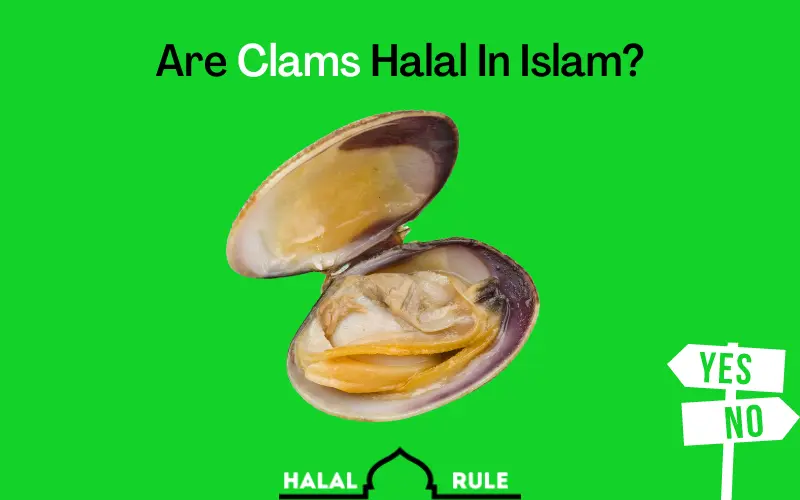Are Clams Halal Or Haram In Islam?
Clams are a type of shellfish that are popular in many cultures around the world.
Clams are commonly used in various dishes, but they have long been a point of contention for those who follow Islamic dietary laws.
Some Muslims believe that clams are haram, while others believe that they are halal.
This article will explore are clams halal or haram and answer related questions according to Islamic teachings.

Are Clams Haram?
The answer to this question depends on what you believe. There are different opinions among Muslims as some follow Quran verses directly, while some follow the teachings of scholars, which are based on other verses of the Quran.
If you ask our opinion, we believe it is better to avoid consuming clams and other types of shellfish altogether due to the potential health risks associated with their consumption.
Also, Islam teaches us to avoid anything we’ve doubted, and the debate of clams being halal or haram is a clear indication of that.
Let’s now look more into the opinions of different Islamic scholars on this matter.
You might also like reading are Oysters halal.
Opinions From Different Islamic Scholars
Some Muslim scholars believe that Clams are halal as Allah has clearly stated that All the seafood are halal in Quran.
This is a verse from Surah Al-Ma’ida (Verse 5:96) –
“Lawful to you is what you catch from the sea and use for food as provision for yourself and for the travelers…”
If we follow this verse directly, then clams will be considered halal.
However, some other scholars believe that Clams are haram because of the potential health risks associated with their consumption.
This scholar say if we consider all the seafood halal, it includes snakes, crabs, and many more unclean or unhealthy sea creatures.
And Islam always teaches us to keep our bodies healthy and away from harm.
So, they advise avoiding clams and other types of shellfish altogether due to the potential health risks associated with their consumption.
This is a matter of opinion, so now it is up to you to decide what is best for you.
If you eat alligator you can also read is alligator halal.
Disadvantage Of Eating Clams
Clams have a few potential health risks associated with their consumption.
They can contain high levels of certain toxins, such as arsenic, mercury, and lead.
High consumption of these toxins can lead to serious health problems such as cancer, birth defects, neurological damage, and organ damage.
There is also a risk of food poisoning from eating clams that are not cooked properly or stored at the correct temperature.
Some benefits of eating clams include being a good source of protein, vitamins, and minerals.
But considering all the potential health risks associated with their consumption, it is better to avoid eating clams altogether.
Also, you can get the same amount of protein, vitamins, and minerals from other halal and clean sources.
Calamari is also a popular seafood, and you can read is calamari halal for an Islamic view on this.
FAQs
Q. Are clams halal shia?
A. In Shia, different opinions are found, but if we consider the teachings of Prophet Muhammad (Peace Be Upon Him) and the Quran, it is better to avoid consuming clams and other types of shellfish altogether.
Q. Are clams halal Sunni?
A. In Sunni, most scholars believe it is haram to consume clams and other types of shellfish, but some believe it is halal.
Q. Are clams halal Hanafi?
A. In Hanafi, most scholars consider clams haram due to the potential health risks associated with their consumption.
Q. Is clam meat halal?
A. Clam meat is considered haram by most Islamic scholars due to the potential health risks associated with their consumption.
Q. Are clams haram?
A. Clams are considered haram by most Islamic scholars due to the potential health risks associated with their consumption. However, some Muslims believe that clams are halal.
Q. Is clam halal in Islam?
A. No, clams are not halal in Islam. Clams fall under the category of seafood, and according to Islamic dietary laws, only certain types of fish are considered halal.
Q. Can Muslims eat clams?
A. No, Muslims are not allowed to eat clams as they are not considered completely halal according to Islamic dietary laws.
Q. Is all seafood halal?
A. No, not all seafood is considered halal in Islam. While some types of fish, such as salmon and tuna, are permissible for consumption, other animals that live in the water, such as shellfish and crustaceans, are not allowed.
Conclusion
Clams are no doubt a popular seafood item, but they are not completely halal, or haram stated food, hence it is better to avoid consuming clams.
Depending on what you believe, some Muslims may choose to avoid clams, while others may be comfortable eating them.
In the end, it is up to you to decide what is best for you. But it is always better to avoid anything on which you have doubts.
We hope that this article has shed some light on the debate are clams halal or haram. We would love to hear your thoughts on this in the comments below.






